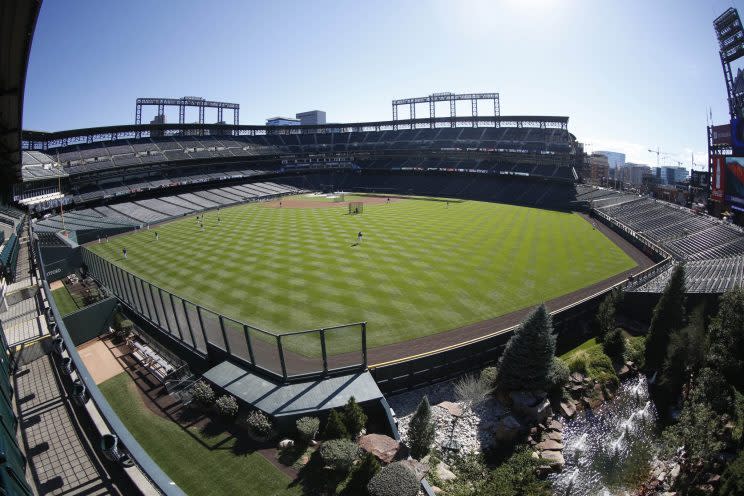Rockies will stay in Coors Field for 30 more years, but should they?
It took four years of negotiations, but the Colorado Rockies will be able to call Coors Field their home for the next 30 years. The Denver Post has reported that the Rockies and the Metropolitan Baseball Stadium District have agreed to a 30-year, $200 million lease. The deal came just in time, too, as the current deal between the Rockies and the State of Colorado (who owns the stadium) was set to expire Thursday.
Coors Field opened in 1995, and is older than all but two National League parks (Wrigley Field and Dodger Stadium). Considering it’s just 22 years old, that’s pretty shocking. The $200 million in this deal wasn’t just a random number — both parties commissioned studies to see how much upkeep and improvements would cost over 30 years for a park that’s already 22. So instead of building an entirely new ballpark, like the Atlanta Braves did when they decided that 20-year-old Turner Field wasn’t good enough for them anymore, the Rockies will continue to maintain and improve Coors Field. By the end of this lease, Coors will have reached the ripe old age of 52.
[Sign up for Yahoo Fantasy Baseball: Get in the game and join a league today]
By far the best thing about this stadium deal is that everyone involved wanted to avoid involving taxpayers at all costs. They didn’t want to levy any taxes that would require residents or visitors to pay for the upkeep and maintenance of the park, unlike the current situation in Arizona (or even the new Texas Rangers ballpark, which will be primarily funded by taxes).
But none of this answers the omnipresent question: should the Rockies continue to play at Coors? Coors Field is unique in that it’s the only MLB ballpark that located a mile above sea level, and that impacts how baseballs behave. Baseballs at Coors are kept in a room-sized humidor so they’re not affected by the dry, thin mountain air, which hardens the baseballs and makes them more receptive to the hit of the bat.

Thanks to the air and the dimensions of the outfield, Coors Field is the most hitter-friendly park in baseball, and it wreaks havoc on Rockies players on a yearly basis. For some Rockies pitchers, their ERAs at home and away can differ widely, and stats for some batters have the same extreme split. Look at Trevor Story, for instance. He hit .313/.393/.693 in 202 plate appearances at Coors Field in 2016. But when he was away from Coors, he hit .235/.292/.454 in 213 plate appearances. Rockies starter Tyler Chatwood is another example. In 2016, he pitched nearly the same number of innings at Coors as he did at other parks. His Coors ERA was 6.12. His away ERA was 1.62.
Those are just two players, and they don’t fully represent the 2016 Rockies or the experience of Rockies players over more than two decades. But it’s a problem that Coors Field plays so differently than every other major league park. (According to ESPN’s 2016 park factors, Chase Field in Phoenix is the only one that comes close to Coors.) It affects their chances of success long term. Unfortunately, this problem doesn’t have an elegant solution. A new park would have to be built, and it would have to be built somewhere that’s not Denver.
Luckily, the team is called the Colorado Rockies and not the Denver Rockies, but moving a team is no small task. There could be another city in Colorado that could support a major league team, but if not that would mean a move out of the state. Not only does no one seem to want that to happen, but moving a team isn’t easy. The last time a team moved was 2005, when the Montreal Expos moved to Washington DC and became the Washington Nationals. And before that, no team had changed cities since 1972.
More than anything, the new lease shows that despite the extreme park factors in play at Coors, all parties involved (including Major League Baseball, who signed off on the new lease on Wednesday morning) are content to let things continue the way they are now. Coors Field will continue to be a frustrating, quirk-filled stadium, and the Rockies will probably continue having issues fielding consistent, extreme-free teams. But at a time when everyone seems to be trying to remove and smooth out baseball’s quirks, it’s sort of comforting that Coors Field will stay the way it is for the next 30 years.
More MLB coverage from Yahoo Sports:
– – – – – –
Liz Roscher is a writer for Big League Stew on Yahoo Sports. Have a tip? Email her at lizroscher@yahoo.com or follow her on twitter! Follow @lizroscher

 Yahoo Sports
Yahoo Sports 
